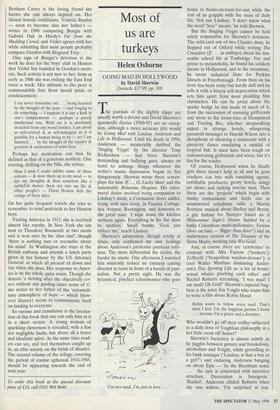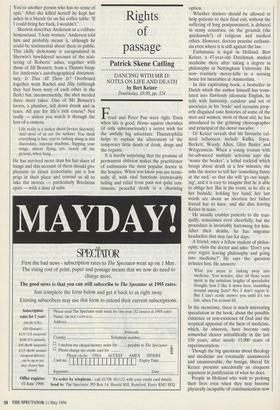Most of us are turkeys
Helen Osborne
GOING MAD IN HOLLYWOOD by David Sherwin Deutsch, £17.99, pp. 300 The journals of the slightly dippy are usually worth a detour and David Sherwin's spasmodic diaries (1960-95) are no excep- tion, although a more accurate title would be Going Mad with Lindsay Anderson and Life in Hollywood. Until his death in 1994, Anderson — memorably dubbed the `Singing Virgin' by the director Tony Richardson — had been Sherwin's demanding and bullying guru, always on hand to unhinge things whenever the writer's manic depression began to fizz dangerously. Sherwin wrote three screen- plays for him: If..., 0, Lucky Man! and the lamentable Britannia Hospital. His extra- mural duties involved being companion to Lindsay's mum, a Coronation Street addict, living, with nice irony, in Fuschia Cottage, Sea Avenue, Rustington, and domestic to the great man: 'I wipe down the kitchen surfaces again. Everything in his flat must be spotless.' Small thanks. 'God, you irritate me,' snarls Lindsay.
Sherwin's admiration, though tetchy at times, only confirmed my own feelings about Anderson's particular patrician lofti- ness. The more deferential the victim, the harder he smote. One afternoon I watched him wantonly reduce an eminent casting director to tears in front of a bunch of jour- nalists. Not a pretty sight. He was the tyrannical, pinched schoolmaster who goes `I'm not mad, I'm just in love . . . ' home to beans-on-toast-for-one while the rest of us grapple with the mess of daily life. Not our Lindsay: 'I don't know what the word "love" means,' he told Sherwin.
But the Singing Virgin cannot be held solely responsible for Sherwin's dottiness. The wild-card son of two Classics dons, he flopped out of Oxford while writing The Crusaders (If . . . in embryo) about his mis- erable school life at Tonbridge. Fey and prone to melancholia, he found his unlikely dream in Hollywood, and in the meantime, he wrote industrial films for Perkins Diesels in Peterborough. From then on his story has been rocky but hardly dull and he tells it with a breezy self-deprecation which sets him apart from most plodding film chroniclers. He can be jovial about the sparky bodge he has made of much of it, from the succession of stunning girlfriends and wives to the loony-bins of Hampstead and Tooting Bec, whether sleepwalking naked in strange hotels, whispering paranoid messages to Harold Wilson into a dictaphone or silencing a restaurant with a piscatory dance emulating a tankful of tropical fish. It must have been tough on remonstrating girlfriends and wives, but it's fun for the reader.
Of course, Hollywood when he finally gets there doesn't help at all and he goes crackers con brio with vanishing agents, certifiable producers, grotty hotels, stingy per diems and lurking rewrite men. Then there are the 'projects' which begin with slushy enthusiasms and fizzle out in unanswered telephone calls: a Martin Scorsese musical about Shelley and Byron; a gay fantasy for Nureyev based on A Midsummer Night's Dream funded by a kinky Colombian multi-millionaire; Venom (Jaws on land — 'Bigger than Jaws!') and an underwater version of The Treasure of the Siena Madre, working title Wet Gold.
And, of course, there are 'celebrities' to contend with: Mia Farrow (`bonkers'); Zeffirelli ('Neapolitan window-dresser'); a cool Walter Matthau dismissing Ander- son's This Sporting Life as 'a lot of homo- sexual whales pinching each other' and Rachel Roberts screaming, 'I was mad! I am mad! Oh God!' Sherwin's especial bug- bear is the actor Jon Voight who wants him to write a film about Robin Hood: Robin wants to follow every road. That's what I feel. I'm the happiest person I know .. • because I'm a priest and a dreamer.
Who wouldn't go off their trolley subjected to a daily dose of Voightian philosophy in a hot little room off Sunset?
Sherwin's buoyancy is almost saintly as he juggles between penury and breakdown, alcoholism and Voight, while grovelling to his bank manager (`Lindsay, is that a boy or a girl?') and enduring Anderson banging on about Epic — 'In the Brechtian sense . . . the epic is concerned with narrative structure. Decoration is bourgeois.' `Rachel', Anderson chided Roberts when she was witless, 'I'm surprised at you. You're another person who has no sense of epic.' After she killed herself he kept her ashes in a biscuit tin on his coffee table: 'If I could bring her back, I wouldn't.'
Sherwin describes Anderson as a celibate homosexual. 'I hate women,' Anderson told him and probably meant it, although he could be sentimental about them in public. This chilly dichotomy is encapsulated in Sherwin's bewildered account of the scat- tering of Roberts' ashes, together with those of Jill Bennett, from a Thames barge for Anderson's autobiographical documen- tary, Is That All There Is? Overboard together went Rachel and JiIly (although they had been wary of each other in the flesh) but, inconveniently, the shot needed three more takes. One of Ms Bennett's lovers, a plumber, fell down drunk and in tears. All par for life's rich course? Not really — unless you watch it through the lens of a camera.
Life really is a turkey shoot [writes Sherwin]. And most of us are the turkeys. You think everything is fine, you're rushing along in this discordant, internal machine, flapping your wings, almost flying, yes, nearly off the ground, when bang ...
He has survived more than his fair share of bangs and this account of them should give pleasure to closet iconoclasts, put a few prigs in their place and remind us all to take the movies — particularly Brechtian epics — with a dose of salts.



































































 Previous page
Previous page